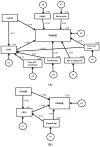Influence of Self-Efficacy on Cancer-Related Fatigue and Health-Related Quality of Life in Young Survivors of Childhood Cancer
- PMID: 35162489
- PMCID: PMC8834926
- DOI: 10.3390/ijerph19031467
Influence of Self-Efficacy on Cancer-Related Fatigue and Health-Related Quality of Life in Young Survivors of Childhood Cancer
Abstract
This study aims to elucidate how self-efficacy influences cancer-related fatigue and health-related quality of life (HRQoL) in young survivors of childhood cancer. Forty-six young survivors (age range, 8-18 years) of childhood cancer who were currently in complete remission completed measures for self-efficacy (Pediatric General Self-Efficacy Scale (PedsSE)), cancer-related fatigue (Cancer-related Fatigue Score (CRFS)), and HRQoL (Pediatric Quality of Life Inventory 4.0 Generic Core Scale, Pediatric Quality of Life Inventory (PedsQL)). Structural relationships between the PedsSE and CRFS or PedsQL, including the effects of potential demographic or clinical confounders, were examined by machine learning random forest algorithms and structural equation modeling. According to the distribution of the PedsQL, six survivors with PedsQL < 70 were determined to have compromised HRQoL (referred to as "low-PedsQL survivors"). The random forest model identified six variables for the prediction of the CRFS, with the PedsSE being the most important, and eight variables for the distinction of low-PedsQL survivors, with the CRFS being the most and the PedsSE the third most important variable. The structural equation model indicated that a direct influence of the PedsSE on the PedsQL was less detectable (β = -0.049), whereas an indirect influence of the PedsSE on the PedsQL via the CRFS was evident (β = 0.333). The model explained 51% of the variation of the CRFS and 28% of the variation of the PedsQL. The PedsSE was strongly correlated with "altered mood" in the subclass of the CRFS (r = -0.470), and "altered mood" was strongly correlated with the PedsQL (r = 0.737). In conclusion, self-efficacy is a major determinant of cancer-related fatigue and influences HRQoL via cancer-related fatigue in survivors of childhood cancer. The main pathway from self-efficacy to HRQoL is thought to be via the emotional aspect of cancer-related fatigue. However, unlike adult survivors of cancer, self-efficacy for young survivors may not contribute much to self-management behaviors that maintain HRQoL.
Keywords: cancer-related fatigue; childhood cancer survivors; health-related quality of life; self-efficacy; structural equation model.
Conflict of interest statement
The authors declare no conflict of interest.
Figures




References
-
- Phillips S.M., Padgett L.S., Leisenring W.M., Stratton K.K., Bishop K., Krull K.R., Alfano C.M., Gibson T.M., de Moor J.S., Hartigan D.B., et al. Survivors of childhood cancer in the United States. Prevalence and burden of morbidity. Cancer Epidemiol. Biomark. Prev. 2015;4:653–663. doi: 10.1158/1055-9965.EPI-14-1418. - DOI - PMC - PubMed
-
- Trama A., Botta L., Foschi R., Ferrari A., Stiller C., Desandes E., Maule M.M., Merletti F., Gatta G., EUROCARE-5 Working Group Survival of European adolescents and young adults diagnosed with cancer in 2000-07: Population-based data from EUROCARE-5. Lancet Oncol. 2016;17:896–906. doi: 10.1016/S1470-2045(16)00162-5. - DOI - PubMed
-
- Nakata K., Ito Y., Magadi W., Bonaventure A., Stiller C.A., Katanoda K., Matsuda T., Miyashiro I., Pritchard-Jones K., Rachet B. Chilhood cancer incidence and survival in Japan and England: A population-based study (1993–2010) Cancer Sci. 2018;109:422–434. doi: 10.1111/cas.13457. - DOI - PMC - PubMed
-
- Park M., Park H.J., Lee J.M., Ju H.Y., Park B.K., Yu E.S., Yang H.K., Kim J.Y., Park S.K., Lee Y.H., et al. School performance of childhood cancer survivors in Korea: A multi-institutional study on behalf of the Korean Society of Pediatric Hematology and Oncology. Psychooncology. 2018;27:2257–2264. doi: 10.1002/pon.4819. - DOI - PubMed
MeSH terms
LinkOut - more resources
Full Text Sources
Medical

